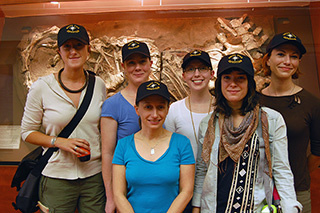
UI graduate student Lindsay Eaves joined an international team of researchers this month to excavate early human fossil remains in the Cradle of Humankind World Heritage Site (COHWHS), just north of Johannesburg, South Africa.
The remains were discovered in Rising Star Cave, nestled in a chamber located almost 100 feet below ground. According to Eaves, the group intends to retrieve the fossils for further study and analysis before the find can be jeopardized by the rainy season or other unnamed factors.
Currently completing her doctoral dissertation in the UI Department of Anthropology, Eaves was selected for the expedition based upon her highly technical skills and small stature. At 118 pounds and 5’5 she is the second largest member of the six-person excavation team.
She and her all-female cohort are part of a rare group of paleoanthropologists around the globe possessing the critical combination of expertise and low body mass that expedition director, National Geographic Explorer in Residence and University of the Witwatersrand professor Lee Berger needed.
The cave in which she will work is accessible only via a narrow opening long enough to fit a person, but no wider than 8 inches.
“I've never excavated within these conditions before, but neither has basically anyone else in our field,” Eaves says. “[The directors of the expedition] have made the decision not to widen or artificially expand the cavern in order to protect the integrity of the find. That means we are met with very tight quarters and a very unpredictable environment.”
Eaves has prior caving experience in Iowa and Missouri, as well as a background in wilderness response and rock climbing. She believes the collaborative undertaking at the COHWHS has the potential to revolutionize her field.
Previous discoveries in the area have uncovered rich collections of ancient human bones, aiding scientists in understanding humans’ earliest origins in Africa. Finds in COHWHS caves have been regarded by many as some of the most significant to take place in palaeoscience.
National Geographic will chronicle the excavation—dubbed the Rising Star Expedition—on its blog. Work is scheduled to take place all this month.